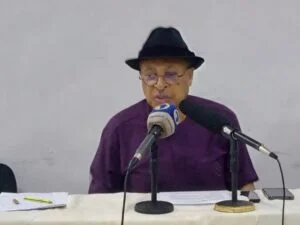“Band A Tariff Exploitative, Lacks Economic Sense” — Pat Utomi Blasts Power Policy, Urges Urgent Reforms
Political economist and public affairs analyst, Prof. Pat Utomi, has called on the Federal Government to revalidate — and possibly scrap — the controversial Band A electricity supply strategy, describing it as exploitative and economically senseless.
Utomi, who is also the Convener of The Big Tent, made the call on Monday during a press conference in Lagos on the state of the nation.
“In Band A, a university professor, for instance, spends 75 per cent of his salary on electricity tariff alone,” Utomi lamented. “If not speedily revalidated, this tariff system will further impoverish Nigerians, especially the working class.”
Band A refers to electricity consumers who are promised at least 20 hours of daily supply and are consequently charged the highest tariffs under a service-based tariff structure by the Nigerian Electricity Regulatory Commission (NERC).
Utomi argued that the policy lacks economic justification and is reaping off ordinary Nigerians.
Turning to legislative matters, the renowned political economist urged the National Assembly to focus more on delivering impactful laws rather than overemphasising oversight functions.
“While oversight remains a fundamental part of the National Assembly’s duties, it should not be prioritised over the legislative function,” he said.
Utomi decried the delay in implementing comprehensive electoral reforms, warning that it would be a disservice for Nigeria to approach the 2027 general elections without a reformed constitution.
“We need pragmatic electoral reforms,” he said. “It is sad that till this moment, the National Assembly has yet to finish all reforms on our elections. It will be a disservice to Nigeria if the nation goes into 2027 with a flawed constitution.”
He also called for constitutional amendments to decentralise Nigeria’s policing system as a strategy to address worsening insecurity.
“It is fundamental that Nigeria should decentralise its policing such that communities or councils can have their own armed police forces as should states, in addition to the federal police forces,” Utomi said. “This is the fastest way now to combat insecurity.”
The political economist warned that the impact of insecurity was most severe in rural areas, where poverty has been exacerbated by the inability of farmers to access their lands.
“Majority of people in rural Nigeria live in chronic poverty,” he said. “The severity of the conditions of insecurity in Nigeria has prevented the peasant farmers in rural areas from farming and driven down their quality of life.”
Utomi said Nigeria was not yet a failed state but risked becoming one if citizens failed to act decisively.
“These threats demand that citizens rally to save the country,” he said. “The Big Tent has purposed that Nigeria’s mission to be a beacon for African peoples and to lead flying geese of nations escaping misery and flocking toward prosperity in the way South East Asia has done, has to be realised.”
Utomi also urged lawmakers to overhaul the land tenure system and improve land registry frameworks to boost the agricultural sector and enable land to serve as valuable collateral for financing.
“Many farmers struggle to access financing due to insufficient collateral, alongside a lack of production and processing infrastructure,” he said. “These challenges are compounded by security concerns stemming from farmer-herder conflicts and climate change impacts.”
To address these structural issues, he advocated long-term planning, massive entrepreneurship development, and the involvement of universities in agricultural extension services — similar to the American land-grant university system.
Utomi stressed that beyond the military and police approach, political engagement with sponsors of terrorism and insurgency is necessary.
“A Forest Rangers scheme already proposed from the Federal Ministry of Agriculture under the watch of Chief Audu Ogbeh as Minister of Agriculture could be justified if we do a cost-benefit analysis of the derivable growth,” he noted.
He added: “The urgency for dealing with this matter of insecurity cannot be overemphasised. Poverty makes deprived and vulnerable people easy recruits for those minded to politically or criminally upset the status quo. Fighting poverty with passion will, therefore, reduce insecurity.”
On electoral apathy, Utomi observed that many Nigerians were disillusioned by the political process and urged for political engagement strategies that would reignite citizens’ interest in elections.
“Many people are fed up with being used by some politicians,” he said, emphasizing the need for sincere political reforms to restore faith in the system.



[…] Economic and Financial Crimes Commission (EFCC) have arrested 32 suspected internet fraudsters in Bauchi […]